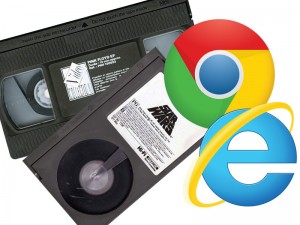Betamax was released to the public on the 10th May 1975, developed by the Sony Corporation. Just over a year later JVC released their VHS format. The decade that followed saw the two formats fight it out for market share dominance. VHS was victorious however technological advancements would also see the demise of this format. Both Betamax and VHS lingered on long after their heyday, the last Betamax tape rolling off the production line in March 2016, a couple of months later the last ever VHS player was produced.
The differences between the two systems seemed quite apparent. Although they both used the same magnetic tape the cassettes they used were different sizes. Today, competing technologies are also in use and their standards can cause issues as to how we consume information.
Internet Explorer was released by Microsoft in 1995, packaged with Windows ’95 and was one of the first graphical browsers. Throughout the late ’90s it was in competition with Netscape’s Navigator, Navigator eventually going the same way as Betamax. Google Chrome was released in 2008 for Microsoft Windows and versions followed for Linux, OS X, iOS and Android.
Much like VHS and Betamax, Internet Explorer and Chrome do the same job, but like the old video standards there are subtle differences in how they work. Internet Explorer is also nearing its end, due to be replaced by Microsoft’s ‘Edge’ browser on Windows 10 machines. But was does this mean for the end user?
For most day-to-day web browsing you should see little difference, the browser used down to personal preference; however there are a few systems within the university that will only work with one or the other.
The Library Gateway’s SHU Player does not work in Chrome or Edge on campus. Embedding video in to a Blackboard site from the content collection does not display a poster in Chrome, but does in Internet Explorer/Edge.
Audio files embedded in a Blackboard item with the old <embed> tag will autoplay when the page is loaded in Chrome, but no longer work in Internet Explorer and isn’t supported in Edge. Files that use the new <audio> tag work fine in all three browsers.
Blackboard was updated over the summer which should hopefully remove some of the issues of cross-browser compatibility but a few anomalies still remain. Like Betamax and VHS, Chrome, IE and Edge they have been produced to different standards, so if resources do not work in one browser, try another. There is unlikely to be solution to this issue while code develops and competing companies produce their own browsers. Technology doesn’t stand still; we are all just playing catch-up.





